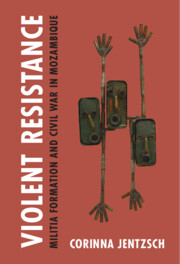Violent Resistance
Why do communities form militias to defend themselves against violence during civil war? Using original interviews with former combatants and civilians and archival material from extensive fieldwork in Mozambique, Corinna Jentzsch’s Violent Resistance explains the timing, location, and process through which communities form militias. Jentzsch shows that local military stalemates characterized by ongoing violence allow civilians to form militias that fight alongside the government against rebels. Militias spread only to communities in which elites are relatively unified, preventing elites from coopting militias for private gains. Crucially, militias that build on preexisting social conventions are able to resonate with the people and empower them to regain agency over their lives. Jentzsch’s innovative study brings conceptual clarity to the militia phenomenon and helps us understand how wartime civilian agency, violent resistance, and the rise of third actors beyond governments and rebels affect the dynamics of civil war, on the African continent and beyond. This title is also available as Open Access on Cambridge Core.
CORINNA JENTZSCH is Assistant Professor of International Relations at Leiden University. She received her PhD from Yale University and studied at Free University Berlin and Sciences Po Paris. Her research interests include civilian collective action in civil war and conflict escalation. She has conducted extensive fieldwork in southern Africa.



